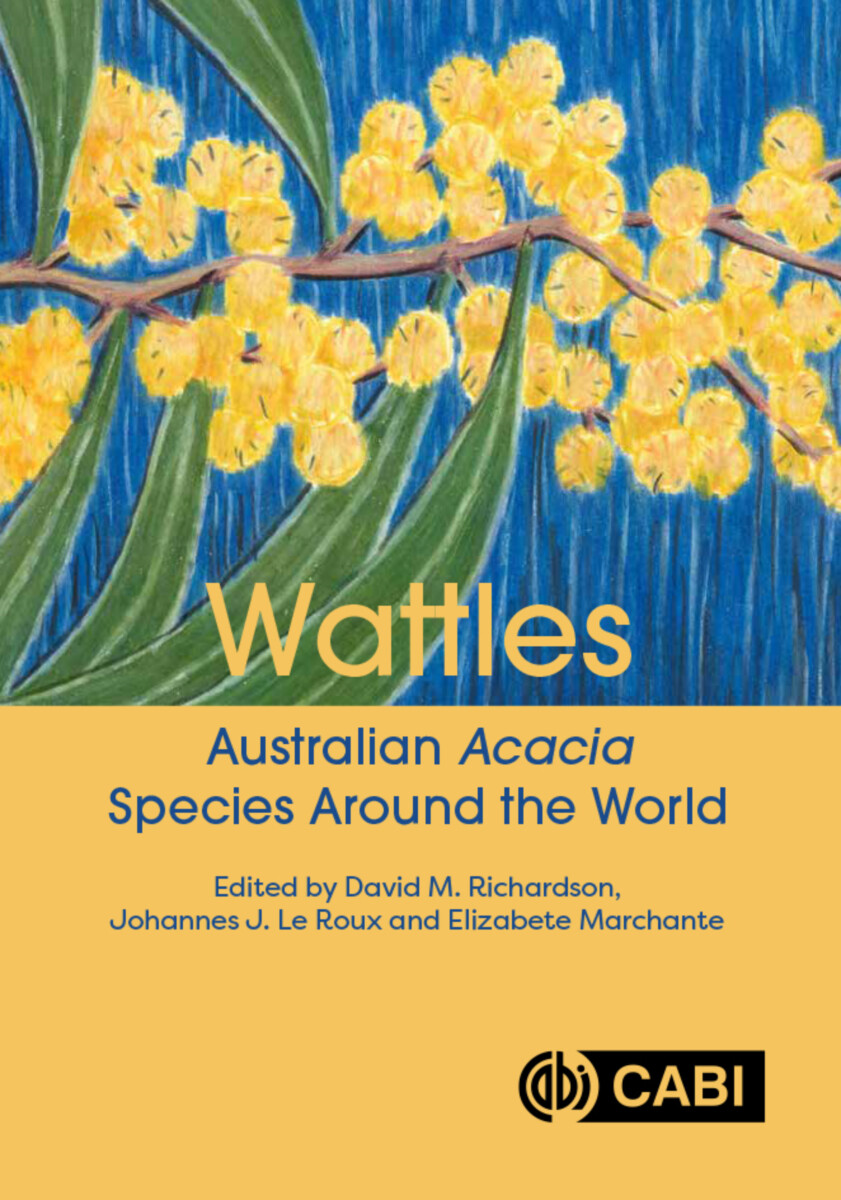Wattles
Australian Acacia Species Around the World
- Publisher
CABI - Published
21st November 2023 - ISBN 9781800622173
- Language English
- Pages 560 pp.
- Size 6" x 9"
The book provides a comprehensive overview of current knowledge about wattles, a large clade of over 1000 species of trees and shrubs in the genus Acacia, most of which are native to Australia. It examines the biology, ecology, evolution, and biogeography of wattles in their native ranges, including the evolutionary forces that have driven past speciation and adaptation to diverse environments, the conservation status, uses and human perceptions of these species. It considers the different histories of the introductions and proliferation of wattles as alien species in different parts of the world since c. 1850 (the Anthropocene), situated within relevant political, socio-economic and scientific contexts, together with an analysis of how awareness of their impacts as invasive species has changed over time. Differences in the dynamics and trends associated with the introduction, naturalization and invasion of wattles in different parts of the world are reviewed. The book also synthesizes the global distribution of wattles using diverse data sources, alongside trends, patterns and projections of global uses of wattles. It discusses the genetics, biotic interactions, and ecological, economic and social impacts of invasive wattles.
The first comprehensive global synthesis in book form of aspects of the biology, ecology, biogeography, and management of one of the world's most important woody plant genera, this book provides the foundation for the assessment of evidence-based information required to formulate sustainable management strategies for non-native plants that have both benefits and negative impacts and sheds new light on many aspects of plant invasion science.
This book is aimed at academics and students in the field of ecology, and at managers of natural and anthropic ecosystems, policy-makers and regulators, and the general public interested in biology and environmental science.
David M. Richardson
David M. Richardson was Director of the DSI-NRF Centre of Excellence for Invasion Biology in South Africa between 2011 and 2022. He is currently a Distinguished Professor in the Department of Botany and Zoology at Stellenbosch University, South Africa. His research focuses on biological invasions, mainly plant invasions. Dave is author or co-author of over 500 journal papers and book chapters and several books, including Invasion Dynamics (Oxford University Press, 2017) and Invading Ecological Networks (Cambridge University Press, 2022). He has edited or co-edited nine books, including Ecology and Biogeography of Pinus (Cambridge University Press, 1998), Fifty Years of Invasion Ecology (Wiley-Blackwell, 2011), Biological Invasions in South Africa (Springer, 2022) and Plant Invasions: The Role of Biotic Interactions (CABI, 2022). He was Editor-in-Chief of the journal Diversity and Distributions between 1998 and 2015. Dave was awarded the Hans Sigrist Prize for 2006 by the University of Bern, Switzerland, in 2012 received the John F.W. Herschel Medal, the senior medal of the Royal Society of South Africa, and in 2019 was recipient of the African Union's Kwame Nkrumah Award for Scientific Excellence (Continental). Most of his work on this book was done while he was on sabbatical leave with support from the Institute of Botany of the Czech Academy of Sciences in Prague, Czech Republic.
Johannes Le Roux
Johannes Le Roux is an Associate Professor in the School of Natural Sciences at Macquarie University, Sydney, Australia. He is also an International Research Associate at the Centre for Invasion Biology, Stellenbosch University, South Africa. He is a plant biologist, broadly interested in the ecology and evolutionary biology of invasive species. His research traverses spatial and temporal scales, from studying the microevolutionary dynamics of populations to interpreting the biogeography of plant species. He is author or co-author of over 130 journal publications and book chapters and is the sole author of the book The Evolutionary Ecology of Invasive Species (Academic Press, 2022). He is a long-standing associate editor for several international journals, including Biological Invasions, Conservation Genetics, Austral Ecology and Oecologia.
Elizabete Marchante
Elizabete Marchante is a researcher at the Centre for Functional Ecology at the University of Coimbra, Portugal, where she co-coordinates a Research Group on Biological Invasions, focusing on the ecology and biocontrol of invasive alien plants. She has published dozens of articles, books and book chapters in collaboration with researchers from all over the world, and has presented her work at over 170 conferences and seminars. She has been involved in 25 national and international projects, including the release of the first biocontrol agent against an invasive plant in Portugal. She is actively involved in public awareness and scientific dissemination, invasive plant management and ecosystem restoration, involving collaboration with national and local authorities, conservation organizations and private companies. She is co-coordinator of the Portuguese platform INVASORAS.PT which disseminates information on invasive plants and promotes citizen science and various outreach initiatives involving different audiences. She has collaborated with DG-Env of the European Commission, IPBES, IUCN, EASIN-JRC, and EPPO.


